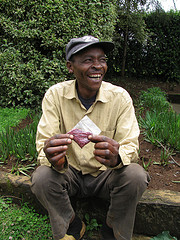- Cotton domestication deconstructed.
- Sunflower domestication deconstructed too.
- Chocolate smell deconstructed.
- Exotic (North American) wild berries deconstructed.
- “Heirloom” deconstructed.
- XXIII Regional agrobiodiversity seminar and the X Regional traditional seed market. The region being Contestado, in Brazil. Deconstruction not available.
Nibbles: Jujubes, Breadfruit, Brassica DNA, Strawberry, Seed packets
- It’s jujube season. Who knew? Anissa Helou, that’s who.
- Big video interview with Diane Ragone, breadfruit suprema.
- Today’s ho-hum genome sequence to promise improved agricultural crops: Brassica rapa.
- Genebank saves (and restores) a rare strawberry. I’m not registering here, but I read about it here. Cool approach.
- ICRISAT jumps on the small-seed-packets-are-beautiful bandwagon.
Brainfood: Roots, Ethnopharmacology, Heat tolerance, Food origin myths, Trees outside forests, Wild fruit tree agroforestry, Viruses in genebank, Reintroduction
- Breeding crop plants with deep roots: their role in sustainable carbon, nutrient and water sequestration. Good for soil structure, good for C sequestration, good for yields. What’s not to like?
- Ethnopharmacology, food production, nutrition and biodiversity conservation: Towards a sustainable future for indigenous peoples. Ethnopharmacologists need to think more generally about nutrition, and a lot more about conservation. And a view on the whole “wonder herb” thing from two botanical garden boffins who protest way too much as far as I’m concerned.
- Modelling predicts that heat stress, not drought, will increase vulnerability of wheat in Europe. It’s the heat, not the humidity. But maybe wild relatives can help.
- The Virtuous Manioc and the Horny Barbasco: Sublime and Grotesque Modes of Transformation in the Origin of Yanesha Plant Life. Maize is the result of a virgin birth, chili peppers of a fart. I’ll buy that.
- Is there a forest transition outside forests? Trajectories of farm trees and effects on ecosystem services in an agricultural landscape in Eastern Germany. Yes, but.
- Biodiversity and socioeconomic factors supporting farmers’ choice of wild edible trees in the agroforestry systems of Benin (West Africa). Those factors are: how important the trees are for food and medicine and how accessible they are. Still no cure for cancer. Anyway, here’s what ICRAF thinks should come next: domestication, natch.
- Pome fruit viruses at the Canadian Clonal Genebank and molecular characterization of Apple chlorotic leaf spot virus isolates. There’s a lot of them. Well that can’t be good, can it?
- A long-term view of rare plant reintroduction. A previous review is way too pessimistic.
Nibbles: Drought, Babylonian gardens, Armenian flora, Urban veggies
- NASA says there has not been a drought-driven decline in plant productivity after all. Yeah but where’s my jet-pack, guys?
- Hanging Gardens of Babylon had date palms and tamarisk. At least.
- Edible wild Armenian plants.
- AVRDC on how to grow vegetables in all sorts of different containers.
You say tree tomato agroforestry
As promised, here’s my interview with the mother-in-law about her attempts to diversify into tree tomatoes. Which incidentally I gather we should be calling Solanum betaceum rather than Cyphomandra betacea. Thanks to Linda for the cinematography.
Sorry about the rather unprofessional ending. And sorry about the poor sound quality, which is due to the fact that I was using the built-in mike on my camera. In case you didn’t get some of the story, here’s a quick recap.
 A local guy called Mr Muiruri came by a few months ago with an offer for grandma. Here he is at right with one of the packets of tree tomato seeds he also sells. He asked to plant some seedlings on her land. He would take care of them and then when they started bearing would pay her KSh 40 a kilo. He is able to sell the fruits for about KSh 60 to kiosk owners in Nairobi, who then sell them on for even more. Grandma agreed, and Mr Muiruri duly planted about 80 or so trees in two or three separate parcels on her land. Here is is harvesting one of these lots, which happens to be intercropped with cabbages. He says the leaves improve the soil.
A local guy called Mr Muiruri came by a few months ago with an offer for grandma. Here he is at right with one of the packets of tree tomato seeds he also sells. He asked to plant some seedlings on her land. He would take care of them and then when they started bearing would pay her KSh 40 a kilo. He is able to sell the fruits for about KSh 60 to kiosk owners in Nairobi, who then sell them on for even more. Grandma agreed, and Mr Muiruri duly planted about 80 or so trees in two or three separate parcels on her land. Here is is harvesting one of these lots, which happens to be intercropped with cabbages. He says the leaves improve the soil.
Mr Muiriuri has similar deals with several other farmers in Gataka. He moves among them on foot, carrying the harvest in plastic bags, then makes his way to the main road, which thankfully is now paved, where he catches a matatu to Limuru and then another to Nairobi. It’s a lot of work, but he’s passionate about his tree tomatoes. And other fruits too. He’s got a small nursery where he plays around with new species as he gets hold of them. A true entrepreneur.
Too bad none of them are local. The “nathi” that the mother-in-law mentions towards the end of the interview is Physalis peruviana, a South American native that was introduced to the Cape about 200 years ago (hence the name, Cape gooseberry) and spread from there to other parts of Africa, where it is used for food and medicine. Not that there are no native edible fruits in the highlands around Limuru. ICRAF’s database lists about a dozen. I talked about some of them with Mr Muriuri. There’s not much he can do without seeds, though, and they’re difficult to find. But I like to think maybe the seed of an idea has been planted.